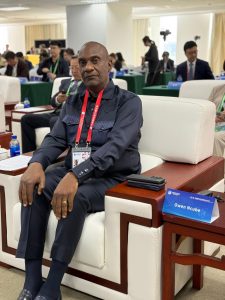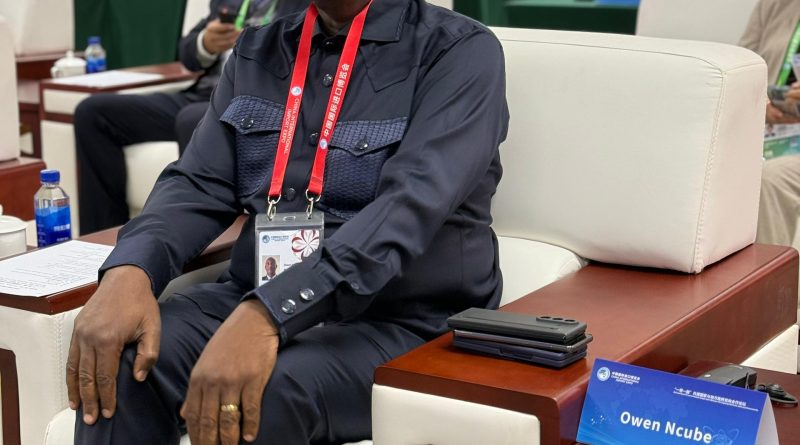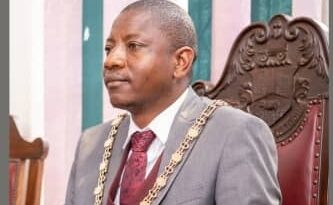Midlands Minister Ncube urges harnessing of heritage-based factors of production in Zim-China Cooperation
By Staff Writer
Midlands Minister of State for Provincial Affairs and Devolution Hon Owen Ncube has urged harnessing of inheritance based factors of production to grow Zimbabwe and China’s economies.

He made the remarks at the China International Import Expo Belt and Road Forum on Mutual Copperation between participating countries and local governments in Shanghai.
Minister Ncube underscored the need to tap into the comprehensive strategic partnership of cooperation pursued by Presidents Mnangagwa and Xi Jinping.
Having attended the 7th edition last year in 2024, it was Minister Ncube’s pleasure to be invited once again by the China Association for International Economic Cooperation to attend the grand event of the inclusive Belt and Road Forum on Mutual Cooperation between member countries and local governments demonstrating mutually beneficial engagements.
“We seek to promote high-quality development of the Belt and Road under the new circumstances, grow our economies, improve the livelihoods of our communities, perpetuate and strengthen bilateral ties between the People’s Republic of China and the Republic of Zimbabwe that date back to the time of Zimbabwe’s liberation struggle,” he said.
The keynote speech came from Long Yongtu,
Former Vice Minister of the Ministry of foreign Economic Relations and Trade and Chief Negotiator of China’s accession to the World Tourism Organisation.
Minister Ncube noted that objectives of the conference aligned with aspirations of the Republic of Zimbabwe as it seeks to attain an upper middle-income society by 2030, anchored on harnessing heritage-based factors of production and enhanced multilateral collaboration and cooperation for shared development opportunities.
“Since assuming membership of the Belt and Road Initiative in September 2018, following the inception of the Second Republic under the visionary leadership of His Excellency the President, Cde Dr E.D. Mnangagwa, the Republic of Zimbabwe has demonstrated unwavering commitment towards globalization, multilateralism, and regional integration through the Southern African Development Community, Common Market for Eastern and Southern Africa, and South-South Cooperation for Sustainable Development,” he said.
The Belt and Road Initiative essentially revived and modernized the ancient Silk Roads historically credited for past people-to-people interactions and trade guided by shared values of equality, mutual benefit, mutual respect, and peaceful coexistence.
It addss to other principles of international relations.
Zimbabwe takes great lessons from China’s miracle growth, and since the inception of the Second Republic on 24 November 2017 under the stewardship of President Mnangagwa, bold and strategic policy decisions were adopted to entrench economic and commercial diplomacy.
Government also seeks to open the economy to domestic and foreign investment, embrace private sector-led innovation, modernization and industrialization of the economy, and pursue “a friend to all and an enemy to none” engagement.
Harare is also persuing a re-engagement strategy which dovetails with the President of the People’s Republic of China, President Xi Jinping’s policy direction of advancing a new round of high-level opening up and China’s major initiative to widen market access to the rest of the world.
“Despite illegal economic sanctions by our detractors, the COVID-19 pandemic and droughts, the Republic of Zimbabwe, in partnership with the private sector, implemented significant Belt and Road Initiative complementary infrastructure development flagship projects that include roads, bridges, dams, ports of entry, power generation and related infrastructure.
“The railway system is earmarked for upgrading and modernization following a high-level meeting between His Excellency the President, Cde Dr E.D. Mnangagwa, and his Chinese counterpart, President Xi Jinping. Midlands Province hosts the Dinson Iron and Steel Plant, a subsidiary of Tsingshan Holdings, touted to become one of the largest steel manufacturing plants in the Southern African region and Africa as a whole,” said Ncube.
The first phase, with an annual capacity of 600,000 metric tonnes of steel, is now complete, producing pig iron, steel billets, and rebars, and currently employing more than 2,000 workers, the majority being locals.
At the national level, Zimbabwe has benefited from flagship projects that include the Robert Gabriel Mugabe International Airport, the new Parliament Building — both in Harare — and the Hwange Unit 7 and 8 thermal power generators, among many other infrastructure investment projects.
The Midlands Province of Zimbabwe is open for tourism, trade and investment as it enjoys comparative advantages ranging from:
‣ Tourism – Zimbabwe has been recognised as the world’s top travel destination for 2025 by Forbes magazine, a renowned global publication.
‣ Strategic central location – suitable for logistics. Zimbabwe links Southern Africa to international markets through South African and Mozambican ports.
‣ Good climatic conditions and diverse ecological regions – suitable for a wide range of agricultural activities. Currently, Zimbabwe is a leading producer of high-quality tobacco and cotton, and its beef is highly regarded.
‣ Natural resources – such as the 12 high-value minerals that include gold, antimony, diamonds, platinum, lithium, iron ore, ferrochrome, nickel, cobalt, silver, silica, and coal, among other minerals. Gas deposits have also been discovered in the Muzarabani area of the country.
‣ High radiation index – provides opportunities in solar power generation.
‣ Devolution of power – to lower tiers of government that has enabled a sustainable and responsive governance system. Provinces and local authorities have been tasked to grow their GDP through embracing ease-of-doing-business reforms and improving service delivery.tap into the comprehensive strategic partnership of cooperation pursued by Presidents Mnangagwa and Xi Jinping.
Having attended the 7th edition last year in 2024, it was Minister Ncube’s pleasure to be invited once again by the China Association for International Economic Cooperation to attend the grand event of the inclusive Belt and Road Forum on Mutual Cooperation between member countries and local governments demonstrating mutually beneficial engagements.
“We seek to promote high-quality development of the Belt and Road under the new circumstances, grow our economies, improve the livelihoods of our communities, perpetuate and strengthen bilateral ties between the People’s Republic of China and the Republic of Zimbabwe that date back to the time of Zimbabwe’s liberation struggle,” he said.
The keynote speech came from Long Yongtu,
Former Vice Minister of the Ministry of foreign Economic Relations and Trade and Chief Negotiator of China’s accession to the World Tourism Organisation.
Minister Ncube noted that objectives of the conference aligned with aspirations of the Republic of Zimbabwe as it seeks to attain an upper middle-income society by 2030, anchored on harnessing heritage-based factors of production and enhanced multilateral collaboration and cooperation for shared development opportunities.
“Since assuming membership of the Belt and Road Initiative in September 2018, following the inception of the Second Republic under the visionary leadership of His Excellency the President, Cde Dr E.D. Mnangagwa, the Republic of Zimbabwe has demonstrated unwavering commitment towards globalization, multilateralism, and regional integration through the Southern African Development Community, Common Market for Eastern and Southern Africa, and South-South Cooperation for Sustainable Development,” he said.
The Belt and Road Initiative essentially revived and modernized the ancient Silk Roads historically credited for past people-to-people interactions and trade guided by shared values of equality, mutual benefit, mutual respect, and peaceful coexistence.
It addss to other principles of international relations.
Zimbabwe takes great lessons from China’s miracle growth, and since the inception of the Second Republic on 24 November 2017 under the stewardship of President Mnangagwa, bold and strategic policy decisions were adopted to entrench economic and commercial diplomacy.
Government also seeks to open the economy to domestic and foreign investment, embrace private sector-led innovation, modernization and industrialization of the economy, and pursue “a friend to all and an enemy to none” engagement.
Harare is also persuing a re-engagement strategy which dovetails with the President of the People’s Republic of China, President Xi Jinping’s policy direction of advancing a new round of high-level opening up and China’s major initiative to widen market access to the rest of the world.
“Despite illegal economic sanctions by our detractors, the COVID-19 pandemic and droughts, the Republic of Zimbabwe, in partnership with the private sector, implemented significant Belt and Road Initiative complementary infrastructure development flagship projects that include roads, bridges, dams, ports of entry, power generation and related infrastructure.
“The railway system is earmarked for upgrading and modernization following a high-level meeting between His Excellency the President, Cde Dr E.D. Mnangagwa, and his Chinese counterpart, President Xi Jinping. Midlands Province hosts the Dinson Iron and Steel Plant, a subsidiary of Tsingshan Holdings, touted to become one of the largest steel manufacturing plants in the Southern African region and Africa as a whole,” said Ncube.
The first phase, with an annual capacity of 600,000 metric tonnes of steel, is now complete, producing pig iron, steel billets, and rebars, and currently employing more than 2,000 workers, the majority being locals.
At the national level, Zimbabwe has benefited from flagship projects that include the Robert Gabriel Mugabe International Airport, the new Parliament Building — both in Harare — and the Hwange Unit 7 and 8 thermal power generators, among many other infrastructure investment projects.
The Midlands Province of Zimbabwe is open for tourism, trade and investment as it enjoys comparative advantages ranging from:
‣ Tourism – Zimbabwe has been recognised as the world’s top travel destination for 2025 by Forbes magazine, a renowned global publication.
‣ Strategic central location – suitable for logistics. Zimbabwe links Southern Africa to international markets through South African and Mozambican ports.
‣ Good climatic conditions and diverse ecological regions – suitable for a wide range of agricultural activities. Currently, Zimbabwe is a leading producer of high-quality tobacco and cotton, and its beef is highly regarded.
‣ Natural resources – such as the 12 high-value minerals that include gold, antimony, diamonds, platinum, lithium, iron ore, ferrochrome, nickel, cobalt, silver, silica, and coal, among other minerals. Gas deposits have also been discovered in the Muzarabani area of the country.
‣ High radiation index – provides opportunities in solar power generation.
‣ Devolution of power – to lower tiers of government that has enabled a sustainable and responsive governance system. Provinces and local authorities have been tasked to grow their GDP through embracing ease-of-doing-business reforms and improving service delivery.
Other speakers at the event in Shanghai included Song Yaoming Former Director-level Commercial Counsellor of the Asia Department of the Ministry of Commerce as well as
Ambassador of Ethiopia to China
H.E.Tefera Derbew.
Elnur Aliyev, the first deputy minister- Ministry of Economy and Pamoda Gooneratne, Consulate General of the Democratic Socialist Republic of Sri Lanka in Shanghai.
Safasharif AKhaliq, the Chief Executive Officer of Export Bahrain also addressed the delegates.




